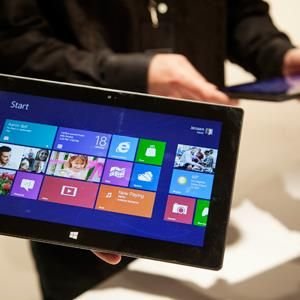J515OP
Super Moderator
This seems to be a balanced article about where MS currently is with Windows 8 and the Surface.
Source: The real work of Windows 8 lies ahead- MSN Money
The real work of Windows 8 lies ahead
Early impressions of Microsoft's newest operating system have focused on its touch-screen functionality and mobile devices. Helping transform the PC may be its bigger task.
By André Mouton, Minyanville
When Windows 8 was released, last October, some early reviews were more memorable than fair.
One critic called it "a Christmas gift for someone you hate." Gaming executive Gabe Newell said Microsoft's (MSFT -1.07%) new operating system "is like this giant sadness." Auto-complete suggestions at Google's (GOOG +0.11%) search engine delivered comparisons to "a bad blind date." (Microsoft is the publisher of MSN Money.)
People talked about Windows the way they talk about Congress, and for basically the same reason. No one likes a compromise.
An important goal for Microsoft when it launched Windows 8 was to get its operating system onto tablets and other mobile devices. For years, PC manufacturers have been beating at the gates of mobile computing, experimenting with more portable designs like netbooks and ultrabooks, and finding only limited success. Windows 8 was to be the Trojan horse that got them in.
"The focus on touch-based computing in Windows 8 is huge," according to a review at the Verge.com. It's "easily among the best tablet user interfaces I've ever tried," says tech site AnandTech.
But while Microsoft has created a compelling alternative for a tablet market currently split between Google's Android and Apple's (AAPL -0.33%) iOS, Windows 8 might turn out to have an even bigger impact, as the driver of the evolution of traditional PCs.
The PC fights back
So far, PC manufacturers have yet to figure out which Windows 8 designs will sell, or at what price. But they understand the importance of getting this right. As things stand, the entire PC ecosystem is threatened by the growth in ultra-mobile devices like the iPad. Large companies like Dell (DELL -0.67%) risk losing ground to smaller innovators like Lenovo and Asus. If the PC dies, they die along with it.
That may be the most controversial thing about Windows 8. In the post-PC narrative, the personal computer isn't supposed to fight back. It's supposed to become obsolete; it’s supposed to be absorbed into the cloud or be replaced by the little gadgets we used to play Angry Birds on. Wild applause greets each new permutation of the iPad/iPhone, while every attempt to redesign the PC is met with head-scratching. The tech world has become as fixated today with mobility as it was a decade ago with megahertz.
There is a fundamental difference, though, between handheld devices that we all use for the same thing -- Twitter, YouTube, Google maps -- and machines that we customize and use differently.
How many of the PCs sold each year are intended to run enterprise software, trade applications or video games that most of us will never hear of? Versatility makes these computers useful, but it also makes that usefulness more specialized, less visible -- and less sexy. With Windows 8, Microsoft is arguing that there are uses for a truly adaptable touch-screen machine, even if we can't envision what they are.
The company has produced a few tablets to try to prove it. The Surface RT is largely indistinguishable from the competition, but the Surface Pro is something different. Like Windows 8, it is a compromise -- a marriage between a tablet and a PC -- and it, too, evoked some negative reactions when it was announced, last year.
The Pro doesn't compare favorably with other tablets on battery life, and its price/performance is not great for a PC. But these comparisons miss the point. Microsoft has never made the best products, just the ones that imposed the fewest restrictions. By combining performance with iPad-like portability, the company has produced what might be the most versatile digital device currently on the market. You can do practically anything with it -- that is, until its battery dies.
The real test will come once more products like the Surface Pro are available, and when metrics like battery life have improved to the point where they are competing on their merits rather than their shortcomings.
We will also, over the next few months and years, find out what other doors have been opened with the introduction of Windows 8 as manufacturers experiment with new form factors like tablet PCs. Whether you love what Microsoft is doing or hate it, there's no denying it's exciting.
Source: The real work of Windows 8 lies ahead- MSN Money

